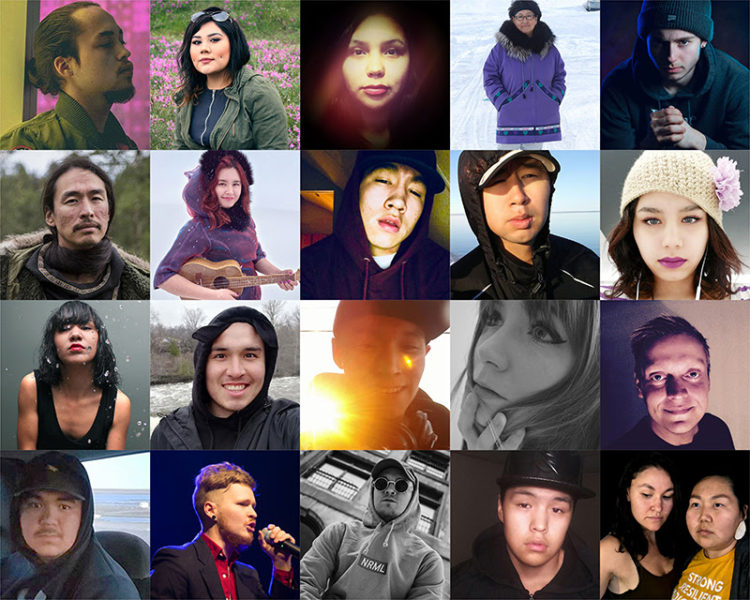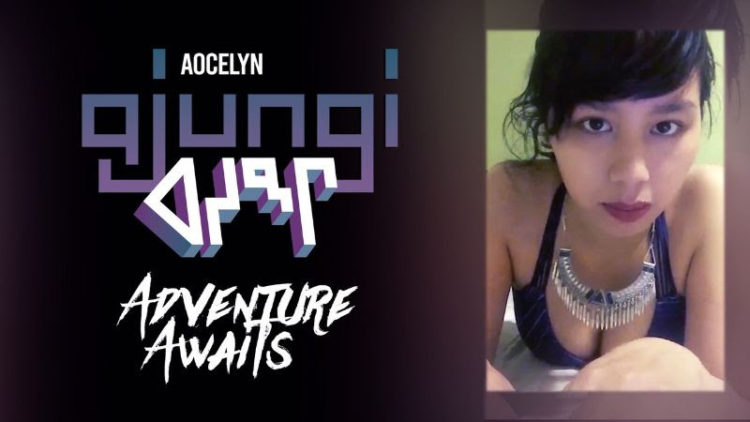
EDITOR’S NOTE: The original version of this article was written before the untimely and tragic death of songwriter Kelly Fraser. Some of the quotes are from before she took her own life Dec. 24, 2019 at just 26, after valiantly struggling for many years with PTSD. The article has since been revised and republished. MLM chose to wait a respectful amount of time after her passing, and now feel it’s important for our readers to understand the importance she and her colleagues place on the project outlined in the article. Our most heartfelt condolences go to all Kelly’s family, friends, collaborators and fans.
A group of musicians, songwriters, producers and record company professionals have come together in a unique project designed to help provide young artists and creators in the remote Canadian territory of Nunavut with an opportunity to share their talents, gifts, music and words with a broader audience.
Under the direction of Iqaluit-based artist and music entrepreneur Thor Simonsen, the Ajungi music collective was born a few years ago, with a recent album under that same name being released through Simonsen’s Hitmakerz label. Simonsen enlisted current recording artists such as Angela Amarualik, Aasiva and the late Kelly Fraser to help facilitate the program and the recording of the Ajungi album.
As Simonsen explained, the Ajungi album was a direct offshoot of a bold, ambitious and rewarding program to help inspire talented Inuit artists to write, record and produce their own music.
“Arctic Hitmakerz is a program where we travel around to remote communities and we do concerts and we do songwriting workshops and music production workshops. And we also donate a small recording studio to each of the communities, who otherwise don’t have any way to record. It’s a program we have been running for just over three years. We have been to 13 communities so far,” explained Simonsen, who said he came up with the idea after working in some of these communities for the territorial government and realizing the dearth of technology available to young Inuit creators.
“These kids did not have access to this kind of equipment. But if they did, some of them might really be drawn to it and be able to develop their skills, which could lead to a lifetime of self sufficiency and artistic expression and all of the wonderful things that come with it. So, I contacted [singer/songwriter, Juno nominee] Kelly Fraser and asked if she would teach the songwriting aspect of it, because I am not Inuk and nor am I fluent in Inuktitut. I wanted to partner with someone who understood the struggles of growing up in these smaller communities and someone to really help emphasize the cultural aspects of it, and really help strengthen Inuktitut.”
When Simonsen, Fraser and their team began fanning out into these communities, they started to realized that there was indeed some talent, and that there were a lot of young people who were aching to explore their creativity and use the medium of words and music to express themselves and talk about their life experiences – the good, the bad and the ugly. In all 19 artists were represented on the 19 songs, including Fraser, as well as, Aocelyn, FxckMr, Aasiva, Ehski, Shauna Seeteenak, Angela Amarualik, N-16, 666god, Manic Range, JBRETON, Stuart Qiyuk, Northern Knowledge, Kirby, Mimi, Uyarakq, and Annie Petaulassie.

“We put out feelers to a lot of these people and got a lot of demos sent back to us. Because everyone was living in dispersed communities, we needed to raise a lot of funding to be able to fly them to Iqaluit to record their songs. Once we had everything recorded, some world-class producers came in to really help bring out the best out in the artists and the songs, and that’s what made it onto the Ajungi album [which came out in December,]” he explained, adding that one of those producers was Bardur Haberg of the Faroe Islands.
“Some artists had a little bit of experience and had practiced songwriting. Others just sent us a hook or an idea or some lyrics that they had written down. So, it really depended on the artist as to how much help the producers gave them. Our whole goal was to get a mix of people, to get them exposed and show them what it’s like to work in the music industry. And we ended up being attracted to the artists that are interested in producing sort of radio friendly pop, and hip hop sounds, and a bit of electronica.
“We had some other artists that we liked a lot, but we realized that this album may not be the right fit for their music. So, we helped them out in different ways, because we wanted to create a lasting piece of work that was really high quality that would be easily accessible for listeners in the southern market. Our mission was to make it so accessible that it’s radio friendly and can have broad appeal. For a lot of the artists, it was their first time in a studio and their first time working with a producer and having any sort of formal interaction with the music business. It was definitely an eye-opening experience for a lot of them.”
Fraser has two songs on the album, the compelling and emotive Next One and The Other Side, which she has sung in both Inuktitut and English. There was a concerted effort on the part of Simonsen and the production to include as much of the traditional language on Ajungi as possible.

“We want to strengthen the language as much as possible. But one issue that is going on in Nunavut is that a lot of young people don’t know their own language. So, there are other musical programs that focus specifically on Inuktitut, but that sort of leaves a lot of different people out in the cold because they don’t necessarily speak their native language. They wish they could, and they are trying to learn. Arctic Hitmakerz offers them an opportunity to be part of something, even of they don’t speak their traditional language fluently,” said Simonsen.
“We also wanted to show everyone, including the artists themselves, that an album like this could be made with people who live in dispersed area. Even after this album was completed, we heard that more and more artists were starting to work together through the internet. As the quality of the internet improves in Nunavut, that will happen more and more. Nunavut is an extremely young population. We’ve got one elder on the album, but most of the artists are between 17 and 24. They have things they want to say about their lives and their culture, and they want to use music, because music is a universal language. I know there can be a sense of isolation living in Nunavut. For myself growing up in Iqaluit, it always feels like the rest of the country is ‘down there’ and it’s easy to feel a little insignificant in the bigger scheme of things. I think a lot of young people in Nunavut just want to have their voices and their messages heard.”
Calling her a ‘leader’ and ‘role model’ – with great justification, Simonsen spoke of Fraser’s importance to the Ajungi project and her legacy in a press release issued on Jan. 23.
“Like many young Inuit, Kelly carried a very heavy burden. I think her PTSD was a direct result of Residential Schools and the subsequent struggles of her people,” said Simonsen in the release.
“And the struggle continues to this day. There is still a dire need for healing in the north, as well as improved quality of life and mental health services. Kelly knew that music was a powerful way to express emotions, break down barriers and change people’s minds. She was a passionate rights activist and advocate for Inuit and her songs will never be forgotten.”
Many of the dozen songs on Ajungi deal with issues or mental health and struggles with addiction. The passing of Fraser brought these issues into the fore once again. That is why producers will donate a portion of album sales to the Kamatsiaqtut Nunavut Hotline (867-979-3333).
The Ajungi album made an immediate splash, landing within the Top 5 on various campus radio stations across Canada, with the music video for the single, Adventure Awaits by Aocelyn getting significant airplay and views since its release on Jan. 23.
“Aocelyn was actually discovered by Kelly, who sent me her video on Facebook and recommended we put her on the Ajungi album,” said Simonsen in the press release, which explained that the song was meant to offer hope and support for all those who feel left out and dispossessed.
The Arctic Hitmakerz program continues, with a second Ajungi album set for release in 2021. Demos and inquiries are already being accepted. For more information, visit www.ajungi.ca.
- Jim Barber is a veteran award-winning journalist and author based in Napanee, ON, who has been writing about music and musicians for a quarter of a century. Besides his journalistic endeavours, he now works as a communications and marketing specialist. Contact him at jimbarberwritingservices@gmail.com.
SHARE THIS POST:
